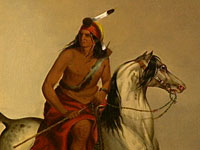Manifest Destiny
Native American Displacement Amid U.S. Expansion
A Conversation With R. David Edmunds
University of Texas at Dallas
 John Mix Stanley
John Mix StanleyBlack Knife, an Apache Warrior (Detail)
Smithsonian American Art Museum,
Gift of the Misses Henry
There is an interesting symbolic portrayal of Manifest Destiny that shows "Columbia," the great American angel or woman, floating over the plains. Ahead of her, in the West, is a great darkness populated by wild animals. There are bears and wolves and Indian people, who are fleeing her light. In her wake come farms, villages and homesteads and in the back are cities and railroads. As the figure progresses across the land, the light of civilization dispels the darkness of ignorance and barbarity.
In this painting, Native American people are portrayed along with the animals and the darkness. They have to be removed before Columbia can bring the prosperity promised to the United States. It's an interesting portrayal and, I think, very symbolic of the thinking of many Americans during the mid-19th century.
Another interesting symbol of Manifest Destiny shows a railroad train coming out of the east with smoke billowing out of its boiler. It's moving west, bringing technological enlightenment into the wilderness. Americans in the 19th century and ever since, have equated civilization with technological development, no matter what the cost, particularly in terms of spirit or morality.
From your viewpoint, how did the United States justify its efforts to expand?
The U.S.-Mexican War and the capture of lands in the Southwest was very difficult for the United States. It was rationalized in terms that it would bring Anglo-Saxon institutions into an area that was devoid of such enlightenment.
Expansion and Indian removal created some phenomenal problems for the new American nation in terms of its moral character. How can this unique experiment in the new world — this nation that prided itself upon its democratic institutions, force Native American people westward? How do you rationalize the taking of land and the usurpation of property?
The argument that was used was, "This had to be done to save these poor Indian people. They don't fit in the East, so we have to move them out beyond the frontier where they can do their Indian thing unmolested. This is the only possible way to save them."
The hypocrisy of this is obvious because many of the people, though not all of them, who were removed were very sophisticated and relatively "civilized" people. For example, the literacy rate of the Cherokee nation is higher than that of the white South up through the Civil War, yet the tribe was moved westward as an uncivilized people, so that their land could be open for American expansion.
Many of the tribes in the Southeast were farmers, who were very successful and "civilized," yet they were moved to Oklahoma. In Indiana, Illinois and Michigan, Native American people who were very active in trade, who were trilingual and very good entrepreneurs, were forced to the plains of Kansas. Many of the people who went into the West became Native American pioneers. They transformed the West because their cultures had been so transformed in the East that they brought many tenants of American "civilization" into the West themselves. It did have an impact upon the West. These people, however, forced many of the tribes indigenous to the region further West and South against the Mexican frontier, which created problems for officials in Mexico.
The U.S.-Mexican War was one of a series of American expansions that took place. One of the legacies of the war was the continued expansion during the latter part of the 19th century. By the end of the century, we expanded from coast to coast. We also expanded into Asia, where we took the Philippines in the Spanish-American War. We became a colonial power in Asia and in the Caribbean, although we did not claim or occupy islands there, with the exception of the Philippines and Puerto Rico. Although we didn't occupy Central America, we exercised phenomenal political, economic and political control in that region.
In expanding, the United States was no better nor worse than most other European North Atlantic countries in the world during that time. We were part of a community of Western European countries— economic powers — doing this. For better or worse, colonies, empires and "spheres of influence" were the accepted form of expansion in the 19th-century.






